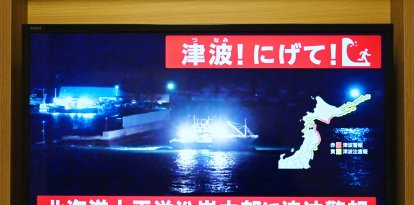An investigation by several media outlets links Havana Syndrome to Russian intelligence
The Kremlin denied new reports accusing it of using "non-lethal acoustic weapons" against US diplomats and their families.

U.S. Embassy in Cuba in 2016 (Flickr - U.S. Department of State)
"If my mother had seen what I saw, she would say, 'It's the Russians, stupid.'" These were the words of Lieutenant Colonel Greg Edgreen to "60 Minutes" as part of an investigation by the program, together with Der Spiegel and The Insider, on what is commonly called Havana Syndrome, suffered by U.S. officials in different parts of the globe.
Havana Syndrome is a combination of "unexplained anomalous health incidents," in the words of the authorities. It was detected in 2016, when American emissaries in the U.S. embassy in Cuba and their families began to suddenly hear loud sounds and experience sensations such as pressure or vibration in the head, hearing loss or ringing, dizziness and instability when walking, among other ailments.
Then American and Canadian diplomats in other countries reported similar symptoms, including Australia, China, Russia and Georgia. According to information recently published by the three outlets, there was a case prior to that in Cuba: a government employee had fallen unconscious two years earlier in Frankfurt, Germany.
The new evidence points to a Russian military intelligence squadron, called GRU Unit 29155. If that's supposedly the who, the what would be "non-lethal acoustic weapons." That is, according to The Insider:
Members of the Russian sabotage team were geolocated in places where the alleged attacks against U.S. personnel and their families abroad took place, according to the report. Some of its senior members were given awards and promotions for their work with this type of weaponry.
Versions found
CBS recognizes in its report that there are still many unknowns to be resolved. No "smoking gun" has been found to prove that the alleged cases of the syndrome were attacks and, if so, who exactly the attacker would be.
A little over a year ago, several U.S. intelligence agencies maintained that it was "very unlikely" that a foreign adversary was behind the symptoms associated with Havana Syndrome, although the degree of confidence varied by agency. They also judged that "there is no credible evidence that a foreign adversary has a weapon or collection device" capable of causing such harms. The most recent medical evidence also points against the attack hypothesis.
The majority of the five agencies concluded that "symptoms reported by U.S. personnel were probably the result of factors that did not involve a foreign adversary, such as preexisting conditions, conventional illnesses, and environmental factors."
In 2022, however, intelligence sources had said that an external source emitting intense energy could have been behind some of the discomfort reported by several Americans.
Russia denies the accusations
"No one has published any convincing evidence, so all this is nothing more than an unfounded and baseless accusation," said Kremlin spokesman Dimitri Peskov, in words reported by AFP.
Peskov maintained that it is an issue that has been circulating in the media for "many years," and that it has always been "linked to the Russian side."

























